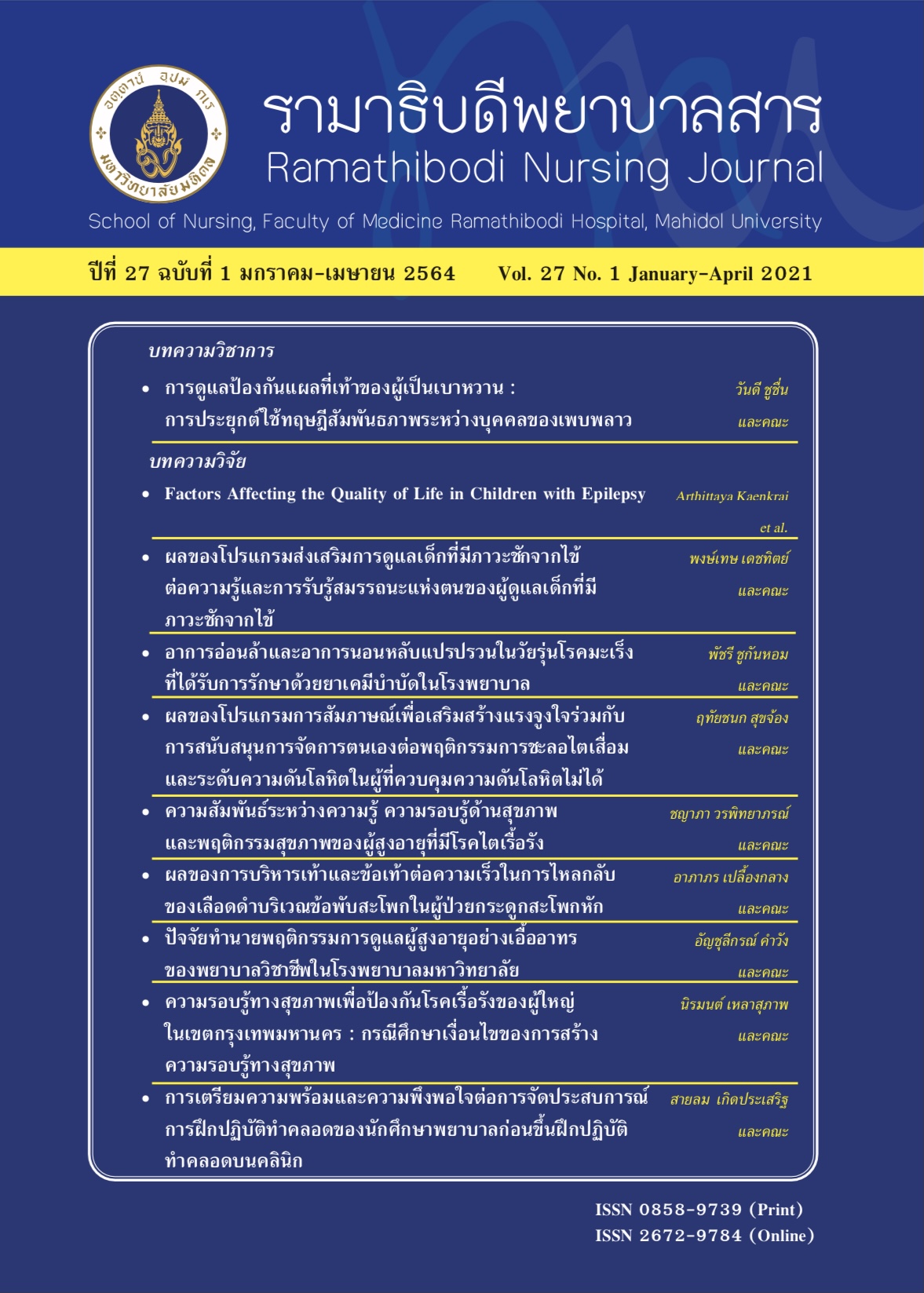Effects of Febrile Convulsion Care Program on Knowledge and Perceived Self-efficacy to Care for Children with Febrile Convulsion among Caregivers
Main Article Content
Abstract
This experimental study with the two-group pretest-posttest research design aimed to examine the effects of the Febrile Convulsion Care Program on knowledge and perceived self-efficacy among primary caregivers of children aged 3 months to 5 years who had a febrile convulsion. The participants consisted of 34 caregivers recruited by purposive sampling from an emergency department and divided into the control and
experimental groups equally (17 each). The data were collected from July 2016 to April 2017. The program was developed using Bandura’s Self-Efficacy Theory as a conceptual framework. The instruments used in this study consisted of the Personal Profile Questionnaire, the Knowledge of Febrile Convulsion Questionnaire, and the Perceived Self-efficacy Questionnaire. The data were analyzed using descriptive statistics, Chi-square, and independent t-test. The results demonstrated that the experimental group had a significantly higher mean score of knowledge and perceived self-efficacy than the control group did after two weeks of study. The program developed in this study is useful for nurses to enhance knowledge and perceived self-efficacy among caregivers of children with febrile convulsion receiving care at the emergency department.
Keywords: Caregiver, Febrile convulsion, Febrile Convulsion Care Program, Knowledge,
Perceived self-efficacy
Article Details
บทความ ข้อมูล เนื้อหา รูปภาพ ฯลฯ ที่ได้รับการตีพิมพ์ในรามาธิบดีพยาบาลสาร ถือเป็นลิขสิทธิ์ของวารสาร หากบุคคลหรือหน่วยงานใดต้องการนำทั้งหมดหรือส่วนหนึ่งส่วนใดไปเผยแพร่หรือเพื่อกระทำการใด ใด จะต้องได้รับอนุญาตเป็นลายลักษณ์อักษรจากรามาธิบดีพยาบาลสารก่อนเท่านั้น
References
Chomboon S, Noonin N, Aekwarangkoon S, Kusol K. The effect of discharge education for caregivers on the revisit of children with acute febrile illness at Nakhon Si Thammarat municipality hospital. Kuakarun Journal of
Nursing 2019;26(1):92-106. (in Thai)
Champi C, Gaffney-Yocum PA. Managing febrile seizures in children. Dimens Crit Care Nurs. 2001;20(5):2-7.
Kolahi AA, Tahmooreszadeh S. First febrile convulsion:inquiry about the knowledge, attitudes and concerns of the patient’s mothers. Eur J Pediatr. 2009;168(2):167-71.
Carman KB, Ekici AE, Yimenicioglu S, Yarar C, Arslantas D, Yakut A. The prevalence of febrile seizure and
associated factors among Trukish children. Int J Clin Pediatr. 2014;3(1):1-4.
Chung S. Febrile seizure. Korean J Pediatr.2014;57(9):384-95.
Aruncharoenrat J. The development of clinical nursing practice guideline in support of febrile convulsion care and prevention. [thesis]. Samut Prakan: Huachiew Chalermprakiet University; 2009. (in Thai)
Paul S, Nair J, Hemming J. Complex febrile seizure in children. Nurs. Time. 2011;107(40);15.
Najimi A, Dolatabadi NK, Esmaeili AA, Sharifirad GR.The effect of educational program on knowledge, attitude
and practice of mothers regarding prevention of febrile seizure in children. J Edu Health Promot. 2013;2(26):1-5.
Walsh AM, Edwards HE. Management of childhood fever by parents: literature review. J Adv Nurs. 2006;54
(2):217-27.
Gajaseni N. Relationships among selected basic conditioning factors, child-care agency, and maternal
care-giving behaviors upon febrile children aged 3 months to 6 years. [thesis]. Nakorn Pathom: Mahidol University;2004. (in Thai)
Lamchang S, Sriboonyawattana N, Nuglor T, Lamchang P. Factors related to parental practices for children with febrile convulsion. Nursing Journal. 2015;42(1):166-77. (in Thai)
Pongjaturawit Y, Chaimongkol N. Experiences of mothers in management of their children with fever. Nursing Journal of The Ministry of Public Health 2015;24(3):29-40.(in Thai)
Rkain M, Rkain I, Safi M, Kabiri M, Ahid S, Benjelloun BDS. Knowledge and management of fever among
Moroccan parents. East Mediterr Health J. 2014;20(6):397-402.
Bandura A. Self-efficacy: Toward a unifying theory of behavioral change. Psychol. Rev. 1977; 84(2):191-
Bandura A. Self-efficacy: The exercise of control. New York: W. H. Freeman and Company: 1997.
Prasopkittikun T. Self - efficacy and health behavior. Thai Journal of Nursing Council. 2001;16(3):1-12. (in Thai)
Panturut P. Effect of knowledge and self-efficacy enhancement program on self-efficacy of caregivers of
children with acyanotic congenital heart disease. [thesis].Nakorn Pathom: Mahidol University; 2011. (in Thai)
Iamsupasit S. Theories and techniques in behavior modification. 6th ed. Bangkok: Chulalongkorn University
Press; 2007. (in Thai)
Sumanit S. Effects of self-efficacy promotion on perceived self-efficacy of caregivers participating in care provided to critically ill children. [thesis]. Nakorn Pathom: MahidolUniversity; 2009. (in Thai)
Faul F, Erdfelder E, Lang AG, Buchner A. G*Power 3:A flexible statistical power analysis program for the social,
behavioral, and biomedical sciences. Behav. Res. Methods.2007;39(2):175-191.
Pornmeesri A, Mettraipan P, Jamkrajang N, Boonsanong K. The results of the program to promote the care and protection of children with febrile convulsion, the efficacy of care in reducing the recurrence of febrile convulsion.[cited 2014 December 20]. Available from: http://www.smpkhos.go.th/document/ F193861.pdf
Elbilgahy AA, Aziz RA. Effect of implementing an educational module on improving mothers knowledge,
home management and attitude about febrile convulsion.J Nurs Educ Pract. 2018;8(3):1-11.
Tabassum SR, Parvaiz N. Effectiveness of structured teaching programme on knowledge regarding management of febrile convulsions among mothers of under five children. Int J Innov Res Sci Eng Technol. 2018:4(1):1168-78.
Soundari ES, Kokilavani N, Kumar CS. A study to assess the effectiveness of educational intervention on knowledge and attitude of mothers regarding care of children with convulsion disorder at Melmaruvathur. Asian Journal of Nursing Education and Research. 2014:4(4);457-60.
Khamenkan K, Phunsa S, Poogpan J, Butpool J, Saengkae R. The effect of a program of nurses providing information to parents’ knowledge and satisfaction on caring for hospitalized children. Nursing Journal. 2017:44(2);71-80. (in Thai)
Srichantaranit A, Chungsomprasong P, Vijarnsorn C,Sukthongsa W, Udomponglukana N, Jaturachaidech C.
Comparing the effects of teaching with VCD and teaching with flip chart on knowledge and anxiety of mothers in
caring for children undergoing cardiac catheterization.Nursing Science Journal of Thailand. 2014;32(2):41-
(in Thai)


